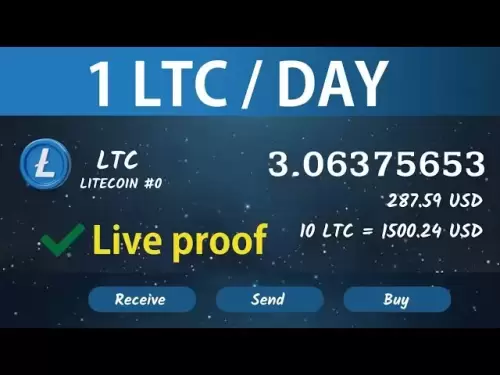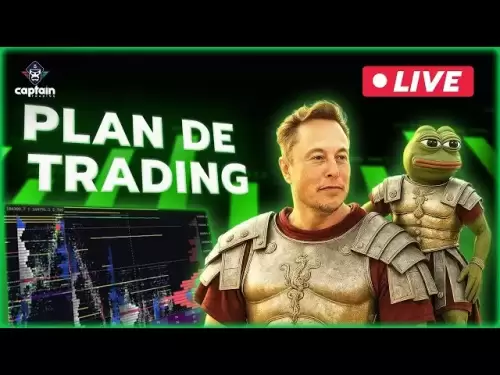-
 Bitcoin
Bitcoin $117400
-0.46% -
 Ethereum
Ethereum $3768
0.60% -
 XRP
XRP $3.551
2.09% -
 Tether USDt
Tether USDt $1.000
0.00% -
 Solana
Solana $203.2
11.30% -
 BNB
BNB $770.9
1.92% -
 USDC
USDC $0.9999
0.01% -
 Dogecoin
Dogecoin $0.2709
-0.02% -
 Cardano
Cardano $0.9024
4.49% -
 TRON
TRON $0.3139
0.60% -
 Hyperliquid
Hyperliquid $45.60
-1.41% -
 Stellar
Stellar $0.4730
-1.34% -
 Sui
Sui $4.025
2.15% -
 Chainlink
Chainlink $19.79
2.19% -
 Hedera
Hedera $0.2724
-2.39% -
 Avalanche
Avalanche $25.93
3.05% -
 Bitcoin Cash
Bitcoin Cash $524.0
-1.83% -
 Shiba Inu
Shiba Inu $0.00001558
0.50% -
 Litecoin
Litecoin $116.7
-0.30% -
 UNUS SED LEO
UNUS SED LEO $8.996
0.00% -
 Toncoin
Toncoin $3.334
1.83% -
 Polkadot
Polkadot $4.506
0.34% -
 Uniswap
Uniswap $10.99
4.83% -
 Ethena USDe
Ethena USDe $1.001
0.03% -
 Pepe
Pepe $0.00001461
3.17% -
 Monero
Monero $320.3
-1.01% -
 Bitget Token
Bitget Token $4.935
0.36% -
 Dai
Dai $0.9998
0.00% -
 Aave
Aave $322.4
-1.25% -
 Bittensor
Bittensor $455.6
9.33%
How to verify the contract in OKX Wallet? Smart contract security detection guide
OKX Wallet offers a robust platform for verifying smart contracts, crucial for ensuring security and transparency in decentralized applications.
May 17, 2025 at 02:43 pm
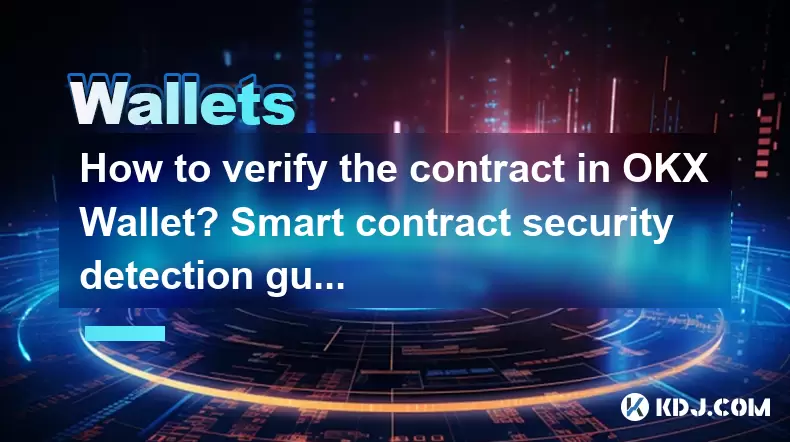
In the world of cryptocurrency, smart contract security is paramount. As users increasingly rely on decentralized applications (dApps) and smart contracts for various financial transactions, ensuring the integrity and security of these contracts becomes crucial. OKX Wallet offers a robust platform for interacting with smart contracts, and verifying these contracts is a key step in maintaining security. This guide will walk you through the process of verifying a contract in OKX Wallet and provide a comprehensive overview of smart contract security detection.
Understanding Smart Contracts and Their Importance
Smart contracts are self-executing contracts with the terms of the agreement directly written into code. They run on blockchain networks, such as Ethereum, and are used to automate transactions and enforce agreements without the need for intermediaries. The importance of smart contracts lies in their ability to provide transparency, reduce costs, and increase efficiency in various applications, from financial services to supply chain management.
However, smart contracts are not immune to vulnerabilities. Common issues include reentrancy attacks, integer overflow/underflow, and improper access control. These vulnerabilities can lead to significant financial losses if exploited. Therefore, verifying and securing smart contracts is essential before deploying them on a live network.
What is Contract Verification?
Contract verification is the process of confirming that the source code of a smart contract matches the bytecode deployed on the blockchain. This step is crucial for transparency and trust. When a contract is verified, users can review the source code, understand its functionality, and ensure that it does not contain malicious code or vulnerabilities.
In OKX Wallet, contract verification involves uploading the source code and compiler settings to a blockchain explorer, which then compares it against the deployed bytecode. If they match, the contract is considered verified, and its source code becomes publicly accessible.
Steps to Verify a Contract in OKX Wallet
To verify a contract in OKX Wallet, follow these detailed steps:
- Open OKX Wallet: Launch the OKX Wallet application on your device.
- Navigate to the DApps Section: Click on the "DApps" tab to access the decentralized applications.
- Select a Blockchain Explorer: Choose a blockchain explorer compatible with the network your contract is deployed on, such as Etherscan for Ethereum.
- Find Your Contract: Enter the contract address in the search bar of the blockchain explorer.
- Initiate Verification: Click on the "Verify and Publish" button next to your contract address.
- Upload Source Code: You will be prompted to upload the source code file (.sol for Solidity) of your contract.
- Enter Compiler Settings: Specify the compiler version and optimization settings used to compile the contract.
- Submit for Verification: After entering all the necessary information, submit the verification request.
- Wait for Verification: The blockchain explorer will compare the uploaded source code with the deployed bytecode. This process may take a few minutes.
- Check Verification Status: Once the verification is complete, you will receive a notification indicating whether the contract was successfully verified.
Importance of Smart Contract Security Detection
Smart contract security detection involves analyzing the code for potential vulnerabilities and ensuring that the contract functions as intended. This step is critical for preventing hacks and ensuring the safety of funds. Various tools and methodologies are available to detect security issues in smart contracts.
Static analysis tools, such as Mythril and Slither, can automatically scan the source code for common vulnerabilities. These tools provide detailed reports on potential issues, allowing developers to address them before deployment. Dynamic analysis, on the other hand, involves testing the contract in a simulated environment to identify runtime vulnerabilities.
Tools and Techniques for Smart Contract Security
Several tools and techniques are available to enhance the security of smart contracts. Here are some of the most effective ones:
- Mythril: An open-source security analysis tool that uses symbolic execution and SMT solving to detect vulnerabilities in Ethereum smart contracts.
- Slither: A static analysis framework that can detect a wide range of vulnerabilities in Solidity smart contracts.
- Remix IDE: An integrated development environment that includes built-in security analysis tools and allows developers to test and debug smart contracts.
- Formal Verification: A mathematical approach to proving the correctness of smart contracts. Tools like K Framework and Coq can be used for formal verification.
- Manual Code Review: A thorough review of the source code by experienced developers can uncover subtle issues that automated tools might miss.
Best Practices for Smart Contract Security
Implementing best practices can significantly enhance the security of smart contracts. Here are some key recommendations:
- Use Established Libraries: Rely on well-tested and widely-used libraries to minimize the risk of introducing vulnerabilities.
- Implement Proper Access Control: Ensure that only authorized users can perform critical operations by using access control mechanisms like OpenZeppelin's AccessControl.
- Avoid Complex Logic: Keep the contract logic as simple as possible to reduce the likelihood of errors and vulnerabilities.
- Regular Audits: Conduct regular security audits by reputable firms to identify and address potential issues.
- Upgradeability: Consider using upgradeable contracts to allow for future improvements and fixes without redeploying the entire contract.
Conclusion and FAQs
Frequently Asked Questions:
Can I verify a contract on a different blockchain explorer other than the one supported by OKX Wallet?
- Yes, you can use any blockchain explorer that supports contract verification. However, ensure that the explorer is compatible with the blockchain network on which your contract is deployed.
What should I do if my contract verification fails?
- If your contract verification fails, double-check the source code and compiler settings you uploaded. Ensure that they match exactly with what was used during deployment. If issues persist, consider seeking help from the blockchain explorer's support team or a smart contract developer.
Is it necessary to verify a contract if it's only used for internal purposes?
- While it's not mandatory, verifying a contract even for internal use can provide an additional layer of security and transparency. It allows for easier auditing and can help prevent accidental vulnerabilities.
How often should I perform security audits on my smart contracts?
- It's recommended to perform security audits at least once before deploying a contract to the mainnet. Additionally, consider conducting audits after significant updates or if there are changes in the contract's environment.
Disclaimer:info@kdj.com
The information provided is not trading advice. kdj.com does not assume any responsibility for any investments made based on the information provided in this article. Cryptocurrencies are highly volatile and it is highly recommended that you invest with caution after thorough research!
If you believe that the content used on this website infringes your copyright, please contact us immediately (info@kdj.com) and we will delete it promptly.
- XRP, Bitcoin, Ripplecoin: Navigating the Crypto Landscape in 2025
- 2025-07-22 20:30:13
- Cardano Ecosystem Watch: Can PayFi Token Remittix Trigger an ADA Overtake?
- 2025-07-22 20:50:13
- JasmyCoin Price Forecast: Chart Analysis Points to Potential Surge
- 2025-07-22 20:55:13
- Remittix, XRP, and Dogecoin: What's Hot in the Crypto Game Right Now?
- 2025-07-22 20:10:14
- BlockchainFX, PEPE, and USDT: What's the Buzz in the Crypto Jungle?
- 2025-07-22 18:50:12
- Ripple's RLUSD: Institutional Backing Fuels Stablecoin Ascent
- 2025-07-22 18:30:12
Related knowledge
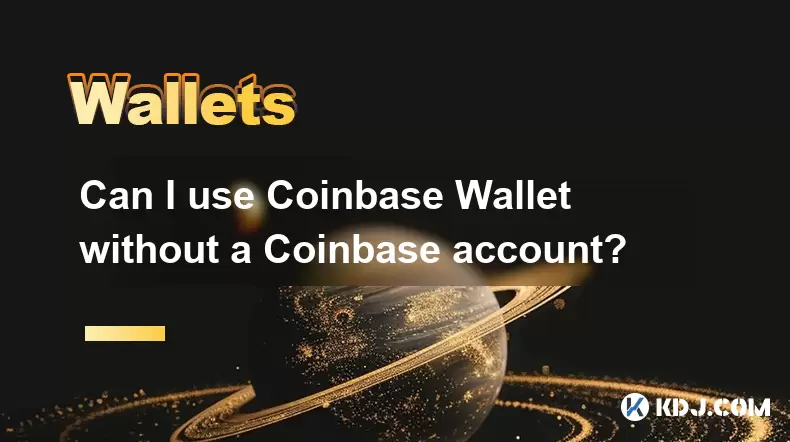
Can I use Coinbase Wallet without a Coinbase account?
Jul 18,2025 at 04:35am
What is Coinbase Wallet?Coinbase Wallet is a self-custodial wallet that allows users to store, send, and receive various cryptocurrencies directly on ...
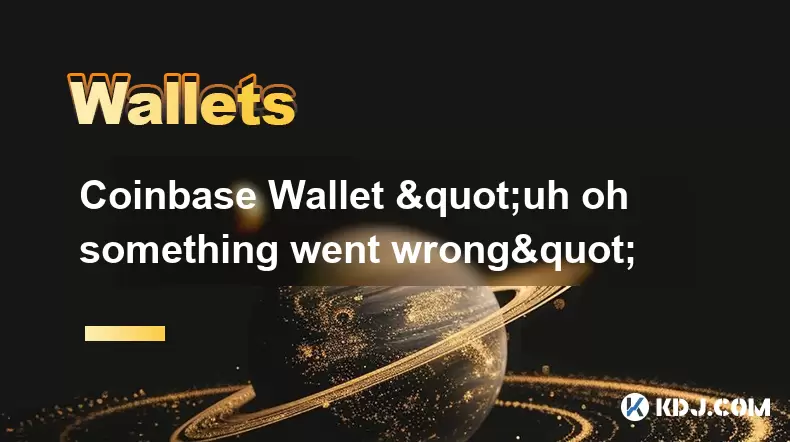
Coinbase Wallet "uh oh something went wrong"
Jul 20,2025 at 10:00am
Understanding the Coinbase Wallet Error: 'Uh Oh, Something Went Wrong'If you're a Coinbase Wallet user, encountering the error message 'Uh Oh, Somethi...
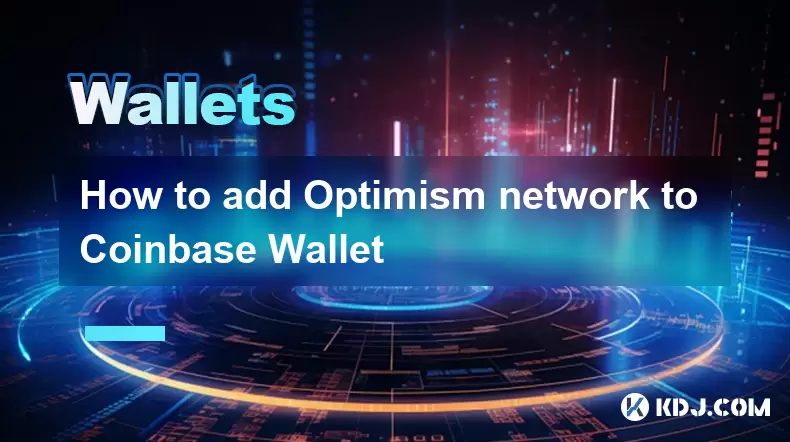
How to add Optimism network to Coinbase Wallet
Jul 20,2025 at 05:21am
What is the Optimism Network?The Optimism network is a Layer 2 scaling solution built on top of the Ethereum blockchain. It aims to enhance transactio...
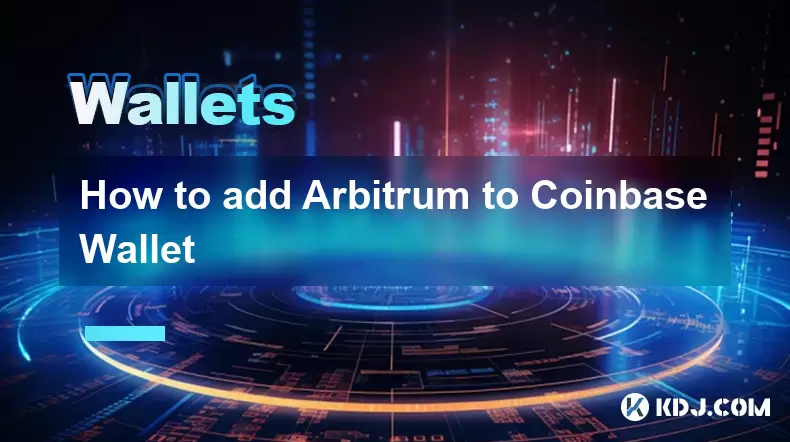
How to add Arbitrum to Coinbase Wallet
Jul 18,2025 at 03:00pm
Understanding Arbitrum and Its Integration with Coinbase WalletArbitrum is a layer-2 scaling solution developed by Offchain Labs to enhance the speed ...
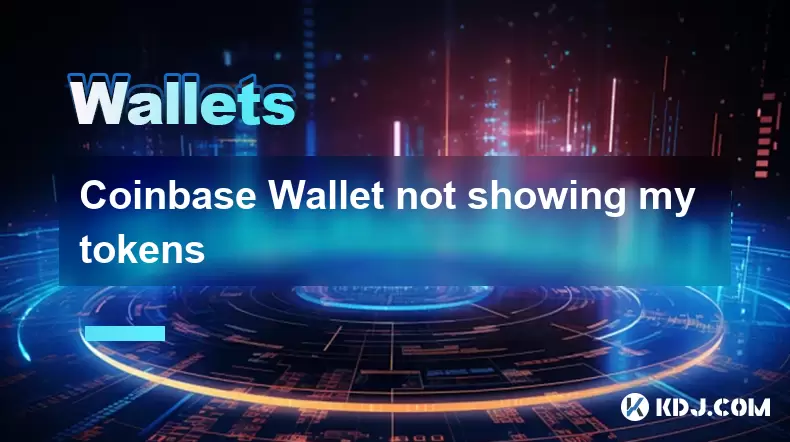
Coinbase Wallet not showing my tokens
Jul 18,2025 at 09:49am
Understanding Coinbase Wallet Token Display IssuesIf you're experiencing issues where Coinbase Wallet not showing my tokens, it can be frustrating, es...
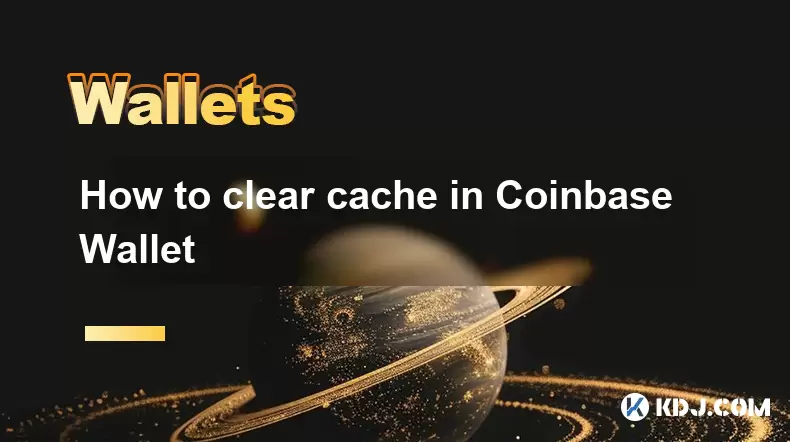
How to clear cache in Coinbase Wallet
Jul 21,2025 at 12:00am
Understanding Cache in Coinbase WalletThe cache in Coinbase Wallet refers to temporary data stored by the application to enhance performance and user ...

Can I use Coinbase Wallet without a Coinbase account?
Jul 18,2025 at 04:35am
What is Coinbase Wallet?Coinbase Wallet is a self-custodial wallet that allows users to store, send, and receive various cryptocurrencies directly on ...

Coinbase Wallet "uh oh something went wrong"
Jul 20,2025 at 10:00am
Understanding the Coinbase Wallet Error: 'Uh Oh, Something Went Wrong'If you're a Coinbase Wallet user, encountering the error message 'Uh Oh, Somethi...

How to add Optimism network to Coinbase Wallet
Jul 20,2025 at 05:21am
What is the Optimism Network?The Optimism network is a Layer 2 scaling solution built on top of the Ethereum blockchain. It aims to enhance transactio...

How to add Arbitrum to Coinbase Wallet
Jul 18,2025 at 03:00pm
Understanding Arbitrum and Its Integration with Coinbase WalletArbitrum is a layer-2 scaling solution developed by Offchain Labs to enhance the speed ...

Coinbase Wallet not showing my tokens
Jul 18,2025 at 09:49am
Understanding Coinbase Wallet Token Display IssuesIf you're experiencing issues where Coinbase Wallet not showing my tokens, it can be frustrating, es...

How to clear cache in Coinbase Wallet
Jul 21,2025 at 12:00am
Understanding Cache in Coinbase WalletThe cache in Coinbase Wallet refers to temporary data stored by the application to enhance performance and user ...
See all articles























